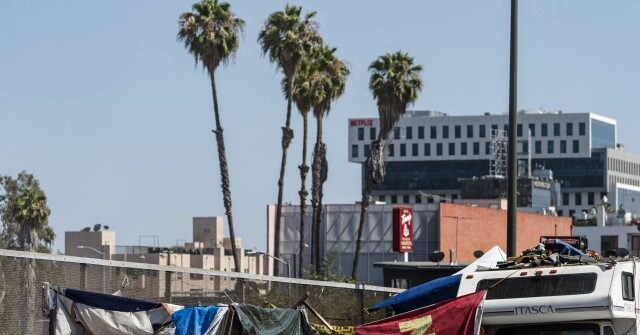In Los Angeles, voters are responding with skepticism toward Measure A, a proposed initiative that seeks to increase sales taxes in the county to bolster services for the homeless. This measure aims to expand on Measure H, which was enacted in 2017 and hiked the sales tax by a quarter of a percent. Despite the intentions behind these initiatives, the homeless population in the region has continued to grow, a trend attributed to multiple factors, including the availability of robust services such as temporary housing. Current polling indicates that support for Measure A hovers around 50%, significantly lower than the approximately 70% backing Measure H garnered during a time when voters were more optimistic about the potential positive effects of increased funding for homelessness.
Politico reports that, while there is no organized opposition to Measure A, there exists a notable level of public skepticism. Measure A proposes an increase of a quarter-cent to the existing 9.5 percent sales tax, promising to generate over $1 billion annually. With Measure H scheduled to lapse in 2027, proponents of Measure A argue that allowing it to expire could exacerbate the already serious homelessness crisis, which currently affects around 75,000 individuals in Los Angeles County, according to the latest annual census. This demographic shift underscores the urgency of addressing the homelessness issue in the region through sustained financial initiatives.
Compounding uncertainties about Measure A’s feasibility are findings from a state audit released this spring, which highlighted weaknesses in California’s oversight of the $24 billion expended on homelessness efforts. This lack of accountability has led to increased public hesitance regarding further financial commitments. An additional report from the LA City Housing Department estimated that resolving homelessness in the city would require an investment of approximately $21.7 billion. Many voters express concern over perceived mismanagement, viewing current expenditures as plagued by inefficiencies, fraud, and waste. Political consultant Michael Trujillo summed up this sentiment, noting that many believe the state has struggled to demonstrate effective use of funding meant for homelessness.
The Los Angeles Times reported that although Measure A shows a lead in polls, a mere 33% of respondents expressed confidence that it would “greatly reduce homelessness,” while 38% believed it wouldn’t make a significant impact. This growing skepticism indicates a shift in the electorate’s perspective, particularly among left-leaning policies. Recent political dynamics reveal that even established political figures aligned with progressive agendas are facing significant challenges. For example, District Attorney George Gascón, supported by George Soros and known for advocating radical criminal justice reforms, is falling behind his opponent Nathan Hochman by a striking 30%, underscoring a rising discontent among the predominantly Democratic constituency regarding leftist initiatives.
Amid these developments, the intersection of public opinion, homelessness, and political realities in Los Angeles is worth examining in depth. The community’s cautious stance toward Measure A reflects a broader trend of skepticism toward governmental financial strategies aimed at addressing complex social issues. The combination of rising homelessness, dissatisfaction with past spending, and a growing awareness of the ineffectiveness of existing policies creates a challenging environment for proponents of Measure A. With significant investments already made without consistent accountability or measurable success, voters are navigating their confidence in new proposals with caution.
As Measure A continues to face scrutiny in the lead-up to the election, the dialogue surrounding homelessness in Los Angeles serves as a critical barometer for shifting political tides. The city’s residents are not just contemplating new tax measures but are actively engaged in reassessing the efficacy of their political leadership and the policies they champion. The growing skepticism towards progressive policies among voters could compel future leaders to adopt a more transparent and accountable approach, particularly in how funds are allocated for homelessness and other pressing social issues. As the situation evolves, the outcomes of initiatives like Measure A will significantly impact not just the immediate challenges of homelessness, but will also shape the broader political landscape in Los Angeles moving forward.

